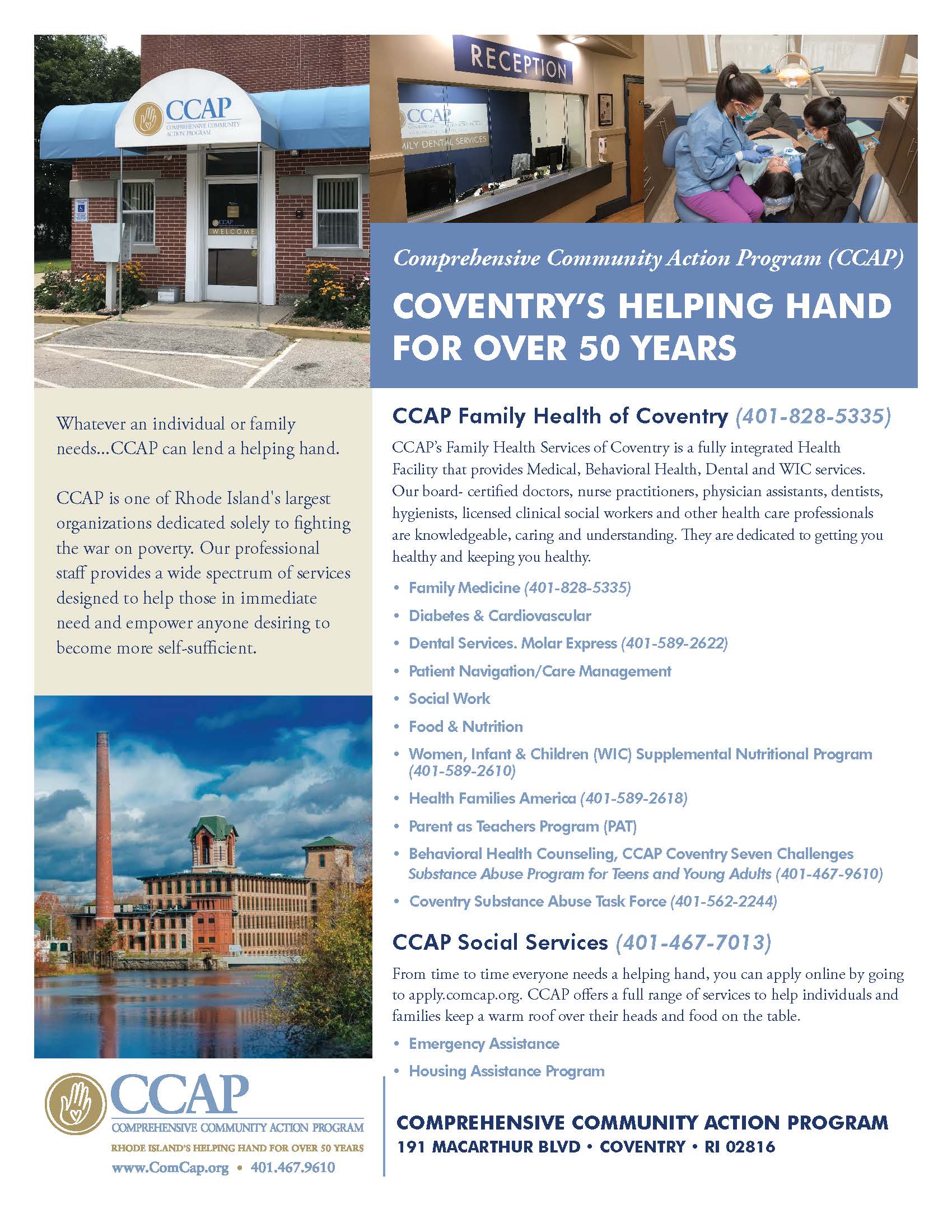
Community Assessment Needs – OUR Community, OUR Needs
Help us learn what Rhode Islanders and those using CCAP services are experiencing right now! Information will be used to identify needed resources and programs!
To take the CCAP Community Needs Assessment Survey, visit: https://forms.office.com/Pages/ResponsePage.aspx?id=o8e1vFE3E0S3v8tP8Y57LsKi0ZKg6XpFk7MtXugoyqtUQVlUSFdINFJRNU1BN0xUVlcyMTBMUFdFTy4u
Your participation will enable you to be entered into a raffle for a $100 supermarket gift card.
THANK YOU!
Learn More
DO YOU LIVE IN COVENTRY AND NEED HELP?
CCAP is Coventry’s largest health and social service agency and we would like to invite you on a brief tour of our facility and our services.
Located at 191 MacArthur Blvd, our state-of-the-art facility, housing our primary health care center, our behavioral health care center and our new dental center is ready to provide you and your family with quality affordable health services.
Our primary health care center, Family Health Services of Coventry, staffed with family medicine physicians and physician assistants along with a team of nurses, medical assistants and social workers provide both office based and home based care; meeting the unique needs of you and your family. From pediatric care to care for seniors, we are prepared to treat your entire family. Our social workers are equipped to help you with all your social service needs and will provide additional supports to you and your family as needed.
Our behavioral health programs offer general counseling and psychiatric services meeting the behavioral health needs of your family and community. Treatment for anxiety, depression, PTSD and addictions are among many behavioral health concerns we address. In partnership with the Coventry School Department, CCAP offers school and home base substance use services for youth struggling with substance use through our “Seven Challenges” program.
CCAP operates the Coventry Substance Abuse Task Force. This community and school-based education and prevention program works closely with the Coventry School Department and the Coventry Police Department keeping all members of the community safe, informed and peaceful.
In 2019, Family Health Services opened a state-of-the-art dental facility. This facility, staffed with Family Dentists, Dental Hygienists and Dental Assistants are prepared to address all your dental needs.
The West Bay Smiles Program and the Molar Express Program are our pediatric community based dental programs bringing mobile oral health care to locations in your community and the Coventry schools.
Our Family Centered programs; Healthy Families America and Parents as Teachers are 2 home based programs providing support and parenting education to young families in the community.
Working closely with our WIC Health Nutrition program, young families receive all the supports necessary to make their families healthy and resilient.
We welcome all residents of Coventry to call with any questions or to meet with any of our staff. Our goal is to keep all residents healthy and safe. For more information, Call us:
401.828.5335, Medical
401.589.2622, Dental
401.589.2610, WIC
Learn More
CCAP Treating Opioid Use Disorder through Suboxone
The words “epidemic” and “opioid use disorder” are words which make a lot people feel very uncomfortable. These are words which we must speak out loud so we can face, head-on, the enormity of a problem that is sweeping across our towns, cities and country. These words speak of a growing crisis that cannot be denied, ignored or underestimated.
An opioid user might ask themselves these three questions to determine the degree to which their use has consumed their lives and interfered with normal activities: “Does my opioid use disrupt my relationships with my family? Does my opioid use disrupt my ability to keep or perform my job? Does my opioid use and the resultant behaviors put me at risk with the law?” A positive answer to these questions should bring this user to the treatments offered at CCAP’s Family Health Centers and to its Suboxone program.
Dr. Ed Westrick, a physician at CCAP who is licensed to prescribe Suboxone, explains that Suboxone is a highly effective way to treat adults with opioid use disorder. It is a drug which can, in conjunction with intensive counseling and psychological support, mitigate the effects of withdrawal and reduce the dependence on prescription pain killers. It is part of a “Medication Assisted Treatment” approach that will break the destructive cycle of abuse.
Those seeking help will find professional care and guidance from the Comprehensive Community Action Program. CCAP was created in 1965 and opened its Family Health Services division in 1971. It is Cranston’s only community health center that provides affordable and high-quality care. In keeping with the mission and values of CCAP, their services are provided to all, regardless of insurance status or the ability to pay. Their sites, conveniently located in Cranston, Warwick and Coventry, offer a sliding fee scale for those who qualify.
Since 2006, CCAP has received uninterrupted accreditation by the Joint Commission. This certification is nationally recognized as a symbol of quality that reflects the organization’s ongoing commitment to meeting and exceeding certain performance standards. This expectation of excellence applies to every program run by CCAP, including its Suboxone initiative. Here, opioid users will find a dedicated team of professionals who have one goal in mind ~ to help you get, and STAY, healthy.
If you or someone you know is struggling with an opioid use disorder, it is imperative that you contact the professionals at CCAP at this number: 401-467-9610. Call today. Life-saving help is available.
Learn More
How to Talk About Your Mental Health
- You’ve been feeling low or irritable for most of the day, every day for two weeks or more. You might have found yourself worrying about past or future events for long periods of time, or simply feeling sad, cross or tearful. Sometimes it’s hard to recognize a gradual change – have others noticed that you don’t seem your usual self?
- You’ve lost interest in activities that you used to enjoy. Perhaps you have been seeing less of your friends or family recently, have stopped going to the gym, or cooking balanced meals. This is really about recognizing changes in what’s normal for you – no one is saying you have to exercise five times a week or eat your greens, but changes in your routine can offer concrete indications that your mood is changing.
- You are struggling to concentrate. You might notice that you struggle to focus when reading or watching television, for example, or to follow the thread of a spoken conversation. This could be affecting your performance at work, or limiting your ability to perform routine tasks such as food shopping. Again, we are looking for a change in what’s normal for you, so if concentration has always been something you find tricky there is little cause for concern.

In three words I can sum up everything I’ve learned about life: it goes on.
– Robert Frost
Antidepressant Medications: What are they?
- You’ve been feeling low or irritable for most of the day, every day for two weeks or more. You might have found yourself worrying about past or future events for long periods of time, or simply feeling sad, cross or tearful. Sometimes it’s hard to recognize a gradual change – have others noticed that you don’t seem your usual self?
- You’ve lost interest in activities that you used to enjoy. Perhaps you have been seeing less of your friends or family recently, have stopped going to the gym, or cooking balanced meals. This is really about recognizing changes in what’s normal for you – no one is saying you have to exercise five times a week or eat your greens, but changes in your routine can offer concrete indications that your mood is changing.
- You are struggling to concentrate. You might notice that you struggle to focus when reading or watching television, for example, or to follow the thread of a spoken conversation. This could be affecting your performance at work, or limiting your ability to perform routine tasks such as food shopping. Again, we are looking for a change in what’s normal for you, so if concentration has always been something you find tricky there is little cause for concern.

In three words I can sum up everything I’ve learned about life: it goes on.
– Robert Frost

Depression: Not Just for Girls?
- You’ve been feeling low or irritable for most of the day, every day for two weeks or more. You might have found yourself worrying about past or future events for long periods of time, or simply feeling sad, cross or tearful. Sometimes it’s hard to recognize a gradual change – have others noticed that you don’t seem your usual self?
- You’ve lost interest in activities that you used to enjoy. Perhaps you have been seeing less of your friends or family recently, have stopped going to the gym, or cooking balanced meals. This is really about recognizing changes in what’s normal for you – no one is saying you have to exercise five times a week or eat your greens, but changes in your routine can offer concrete indications that your mood is changing.
- You are struggling to concentrate. You might notice that you struggle to focus when reading or watching television, for example, or to follow the thread of a spoken conversation. This could be affecting your performance at work, or limiting your ability to perform routine tasks such as food shopping. Again, we are looking for a change in what’s normal for you, so if concentration has always been something you find tricky there is little cause for concern.

In three words I can sum up everything I’ve learned about life: it goes on.
– Robert Frost
How Music Affects Our Subconscious
- You’ve been feeling low or irritable for most of the day, every day for two weeks or more. You might have found yourself worrying about past or future events for long periods of time, or simply feeling sad, cross or tearful. Sometimes it’s hard to recognize a gradual change – have others noticed that you don’t seem your usual self?
- You’ve lost interest in activities that you used to enjoy. Perhaps you have been seeing less of your friends or family recently, have stopped going to the gym, or cooking balanced meals. This is really about recognizing changes in what’s normal for you – no one is saying you have to exercise five times a week or eat your greens, but changes in your routine can offer concrete indications that your mood is changing.
- You are struggling to concentrate. You might notice that you struggle to focus when reading or watching television, for example, or to follow the thread of a spoken conversation. This could be affecting your performance at work, or limiting your ability to perform routine tasks such as food shopping. Again, we are looking for a change in what’s normal for you, so if concentration has always been something you find tricky there is little cause for concern.

In three words I can sum up everything I’ve learned about life: it goes on.
– Robert Frost
